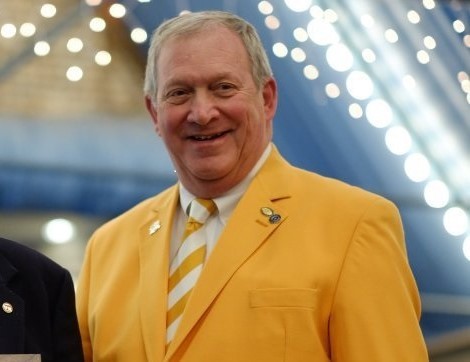One of our friends is hospitalized. I phoned the general manager to request tender, loving care.
I was interrupted and assured that the University of South Carolina hospital in Charleston has cared for many celebrities. I explained that this one is special. I think the manager may actually have listened.
Dick Williams, insurance executive and civic leader, was a defensive tackle in the Doug Dickey era and Volunteer captain in 1968. He and his wife, Susan (even more famous), are major contributors to the University of Tennessee.
Dick is president of the East Tennessee chapter of the National Football Foundation and College Hall of Fame. Susan, former UT trustee and former TVA board member, has her own public relations firm. She has been very prominent in Republican politics.
So, Captain Williams, what the heck is going on?
“I have been diagnosed with Guillian-Barre syndrome. I had never heard of it but it sounds sort of serious.”
I have heard of it and I think it can be.
Dick and Susan were at Hilton Head with their grandchildren for the holidays. Dick says he developed tingling and numbness in his feet and lower legs. He went to the hospital. He hopes, when he is better, to be transferred to Knoxville for rehab.
I am a second-hand “expert” (from a safe distance) on Guillian-Barre syndrome. It is a rare disorder where the immune system, for some strange reason, attacks the nerves. Another dear friend, Greeley Kyle, freshman tackle in 1976, had a terrifying bout.

Greely Kyle
Recollections? Greeley, a journalism professor at UMass, responded immediately. He said his first clue came in the UT weight room. He was pressing 225 pounds but couldn’t hold onto the bar.
“I got some straps, tied my hands to the bar and finished my workout.”
Greeley went to dinner at the team training table.
“Massive grilled steaks. My knife kept slipping out of my hand. I finally had to ask a teammate to cut my meat for me. The next morning an extreme fatigue overcame me, and I had to stop and rest three times just walking to class. I knew something was wrong. The team doctor sent me to a neurologist.
“He told me a virus was attacking my nervous system and was working its way from my extremities to my spinal column. Little was known about the disease, but he was concerned about the speed with which it was moving.
“Within hours I stopped breathing, and spent my first night in what was to become my home for many months, the Intensive Care Unit, with a respirator as my constant companion.
“The bellows and tubing kept me alive, while my body wasted away. My throat muscles were paralyzed so I couldn’t eat, and was fed via IVs and a tube into my stomach. Despite constant physical therapy, atrophy set in.
“The team of doctors studying me said there was nothing they could do, but keep me alive until the disease went away, then rebuild me.”
Along about then was when Sarah West got involved. Greeley’s parents were educators, at Alabama A&M University, just outside Huntsville. They had to return to teaching.
The Kyles signed a document authorizing Sarah to visit their son on a regular basis as “a family member.”
The first visit triggered an identity crisis. A nurse superior said halt, who goes there?
She questioned the “family” clause. Keep in mind that this was the mid-1970s. The Kyles are black. Sarah is white, and blond.
Through the years, both families laughed about the incident. The Kyles did not laugh about Sarah’s concern for their boy. They were very grateful. Greeley didn’t say much at the time. He was paralyzed to the point that he couldn’t close his own eyelids.
Eventually, Greeley found ways to regain control of his body, a twitch here, a quiver there.
“Slowly, I learned how to push against the respirator to strengthen my lungs and diaphragm. Finally, after nine weeks, I could breathe on my own, and when I was strong enough to sit up, they strapped me into a wheel chair and began to wheel me around.
“That first day, I asked the orderly to take me outside. He said, ‘It’s raining!’ And I told him that I didn’t care, so he pushed my wheelchair out into the rain, and I exulted in the feel of months of captivity sliding off, and the joy of the rain as it soaked my shirt and shorts.”
One day Greeley went for a ride to the hospital freight scale. He had lost 100 pounds from his football weight. He remembers that he was “skin and bones.”
He graduated to a rehab center. He learned again how to walk. He could finally dress himself. Later, he learned how to handle a knife and fork. In case you are wondering, Greeley was a quick learner. He is very smart, very.
He eventually made it back to UT. Two doctors had bet $100 on whether he would ever play football again. He didn’t. The athletic department rejected the risk. It did honor the scholarship. It paid for his degree in journalism.
Let us pray Dick Williams has a softer strain of Guillian-Barre syndrome. Maybe he got a quicker start on treatment. Maybe he will escape the agony and despair. He sounded great yesterday, much stronger than the old man calling in.
(Marvin West invites reader reaction. His address is marvinwest75@gmail.com)

